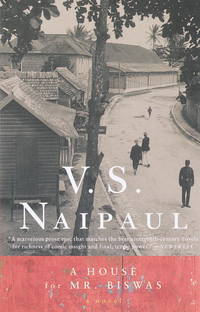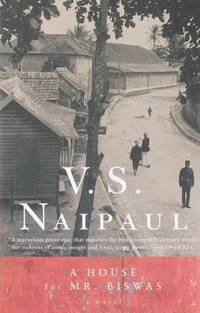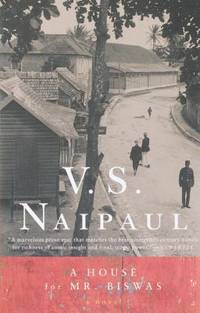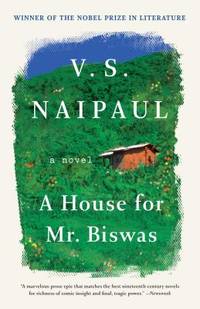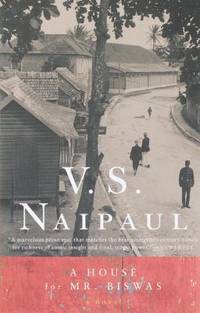About this book
V.S. Naipaul’s A House for Mr. Biswas tells the
story of Mohun Biswas, an Indo-Trinidadian, who struggles as he yearns for a
place he can call home following the death of his father. Homeless and
loveless, he wanders from place to place, from one type of work to another,
with every small success matched by a humiliation.
A House for Mr. Biswas is primarily a sharply
drawn look at life that uses postcolonial perspectives to view a vanished colonial
world. The novel—Naipaul's first work to achieve acclaim worldwide— is ranked
72nd on Modern Library’s “100 Best” English-language novels of the
20th century, won the Nobel Prize in Literature, and is listed in TIME’s “100
Best Novels” (since 1923).
From the publisher
From the Nobel Prize-winning author: an unforgettable comedy of manners inspired by the author's father that has been hailed as one of the twentieth century's finest novels. "A marvelous prose epic that matches the best nineteenth-century novels for richness of comic insight and final, tragic power." --Newsweek In his forty-six short years, Mr. Mohun Biswas has been fighting against destiny to achieve some semblance of independence, only to face a lifetime of calamity. Shuttled from one residence to another after the drowning death of his father, for which he is inadvertently responsible, Mr. Biswas yearns for a place he can call home. But when he marries into the domineering Tulsi family on whom he indignantly becomes dependent, Mr. Biswas embarks on an arduous--and endless--struggle to weaken their hold over him and purchase a house of his own. A heartrending, dark yet comedic novel, A House for Mr. Biswas masterfully evokes a man's quest for autonomy against an emblematic post-colonial canvas.
From the jacket flap
The early masterpiece of V. S. Naipaul's brilliant career, A House for Mr. Biswas" is an unforgettable story inspired by Naipaul's father that has been hailed as one of the twentieth century's finest novels.
In his forty-six short years, Mr. Mohun Biswas has been fighting against destiny to achieve some semblance of independence, only to face a lifetime of calamity. Shuttled from one residence to another after the drowning death of his father, for which he is inadvertently responsible, Mr. Biswas yearns for a place he can call home. But when he marries into the domineering Tulsi family on whom he indignantly becomes dependent, Mr. Biswas embarks on an arduous-and endless-struggle to weaken their hold over him and purchase a house of his own. A heartrending, dark comedy of manners, A House for Mr. Biswas masterfully evokes a man's quest for autonomy against an emblematic post-colonial canvas.
First Edition Identification
André Deutsch first published A House for Mr.
Biswas in London in 1961. First editions state “First Published 1961” on the
copyright page. Signed first editions have sold for upwards of $3,500.
Details
-
Title
A House for Mr. Biswas
-
Author
V. S. Naipaul
-
Binding
Paperback
-
Edition
[ Edition: first
-
Pages
576
-
Volumes
1
-
Language
ENG
-
Publisher
Vintage, New York, New York, U.S.A.
-
Date
2001-03-13
-
ISBN
9780375707162 / 0375707166
-
Weight
0.95 lbs (0.43 kg)
-
Dimensions
7.94 x 5.28 x 0.99 in (20.17 x 13.41 x 2.51 cm)
-
Reading level
900
-
Themes
- Demographic Orientation: Rural
- Demographic Orientation: Small Town
- Ethnic Orientation: Indian
-
Library of Congress subjects
Domestic fiction, Humorous fiction
-
Library of Congress Catalog Number
00049056
-
Dewey Decimal Code
FIC
Excerpt
I. Pastoral
Shortly before he was born there had been another quarrel between Mr Biswas's mother Bipti and his father Raghu, and Bipti had taken her three children and walked all the way in the hot sun to the village where her mother Bissoondaye lived. There Bipti had cried and told the old story of Raghu's miserliness: how he kept a check on every cent he gave her, counted every biscuit in the tin, and how he would walk ten miles rather than pay a cart a penny.
Bipti's father, futile with asthma, propped himself up on his string bed and said, as he always did on unhappy occasions, 'Fate. There is nothing we can do about it.'
No one paid him any attention. Fate had brought him from India to the sugar-estate, aged him quickly and left him to die in a crumbling mud hut in the swamplands; yet he spoke of Fate often and affectionately, as though, merely by surviving, he had been particularly favoured.
While the old man talked on, Bissoondaye sent for the midwife, made a meal for Bipti's children and prepared beds for them. When the midwife came the children were asleep. Some time later they were awakened by the screams of Mr Biswas and the shrieks of the midwife.
'What is it?' the old man asked. 'Boy or girl?'
'Boy, boy,' the midwife cried. 'But what sort of boy? Six-fingered, and born in the wrong way.'
The old man groaned and Bissoondaye said, 'I knew it. There is no luck for me.'
At once, though it was night and the way was lonely, she left the hut and walked to the next village, where there was a hedge of cactus. She brought back leaves of cactus, cut them into strips and hung a strip over every door, every window, every aperture through which an evil spirit might enter the hut.
But the midwife said, 'Whatever you do, this boy will eat up his own mother and father.'
The next morning, when in the bright light it seemed that all evil spirits had surely left the earth, the pundit came, a small, thin man with a sharp satirical face and a dismissing manner. Bissoondaye seated him on the string bed, from which the old man had been turned out, and told him what had happened.
'Hm. Born in the wrong way. At midnight, you said.'
Bissoondaye had no means of telling the time, but both she and the midwife had assumed that it was midnight, the inauspicious hour.
Abruptly, as Bissoondaye sat before him with bowed and covered head, the pundit brightened, 'Oh, well. It doesn't matter. There are always ways and means of getting over these unhappy things.' He undid his red bundle and took out his astrological almanac, a sheaf of loose thick leaves, long and narrow, between boards. The leaves were brown with age and their musty smell was mixed with that of the red and ochre sandalwood paste that had been spattered on them. The pundit lifted a leaf, read a little, wet his forefinger on his tongue and lifted another leaf.
At last he said, 'First of all, the features of this unfortunate boy. He will have good teeth but they will be rather wide, and there will be spaces between them. I suppose you know what that means. The boy will be a lecher and a spendthrift. Possibly a liar as well. It is hard to be sure about those gaps between the teeth. They might mean only one of those things or they might mean all three.'
'What about the six fingers, pundit?'
'That's a shocking sign, of course. The only thing I can advise is to keep him away from trees and water. Particularly water.'
'Never bath him?'
'I don't mean exactly that.' He raised his right hand, bunched the fingers and, with his head on one side, said slowly, 'One has to interpret what the book says.' He tapped the wobbly almanac with his left hand. 'And when the book says water, I think it means water in its natural form.'
'Natural form.'
'Natural form,' the pundit repeated, but uncertainly. 'I mean,' he said quickly, and with some annoyance, 'keep him away from rivers and ponds. And of course the sea. And another thing,' He added with satisfaction. 'He will have an unlucky sneeze.' He began to pack the long leaves of his almanac. 'Much of the evil this boy will undoubtedly bring will be mitigated if his father is forbidden to see him for twenty-one days.'
'That will be easy,' Bissoondaye said, speaking with emotion for the first time.
'On the twenty-first day the father must see the boy. But not in the flesh.'
'In a mirror, pundit?'
'I would consider that ill-advised. Use a brass plate. Scour it well.'
'Of course.'
'You must fill this brass plate with coconut oil--which, by the way, you must make yourself from coconuts you have collected with your own hands--and in the reflection on this oil the father must see his son's face.' He tied the almanac together and rolled it in the red cotton wrapper which was also spattered with sandalwood paste. 'I believe that is all.'
'We forgot one thing, punditji. The name.'
'I can't help you completely there. But it seems to me that a perfectly safe prefix would be Mo. It is up to you to think of something to add to that.'
'Oh, punditji, you must help me. I can only think of hun.'
The pundit was surprised and genuinely pleased. 'But that is excellent. Excellent. Mohun. I couldn't have chosen better myself. For Mohun, as you know, means the beloved, and was the name given by the milkmaids to Lord Krishna.' His eyes softened at the thought of the legend and for a moment he appeared to forget Bissoondaye and Mr Biswas.
From the knot at the end of her veil Bissoondaye took out a florin and offered it to the pundit, mumbling her regret that she could not give more. The pundit said that she had done her best and was not to worry. In fact he was pleased; he had expected less.
Mr Biswas lost his sixth finger before he was nine days old. It simply came off one night and Bipti had an unpleasant turn when, shaking out the sheets one morning, she saw this tiny finger tumble to the ground. Bissoondaye thought this an excellent sign and buried the finger behind the cowpen at the back of the house, not far from where she had buried Mr Biswas's navel-string.
In the days that followed Mr Biswas was treated with attention and respect. His brothers and sisters were slapped if they disturbed his sleep, and the flexibility of his limbs was regarded as a matter of importance. Morning and evening he was massaged with coconut oil. All his joints were exercised; his arms and legs were folded diagonally across his red shining body; the big toe of his right foot was made to touch his left shoulder, the big toe of his left foot was made to touch his right shoulder, and both toes were made to touch his nose; finally, all his limbs were bunched together over his belly and then, with a clap and a laugh, released.
Mr Biswas responded well to these exercises, and Bissoondaye became so confident that she decided to have a celebration on the ninth day. She invited people from the village and fed them. The pundit came and was unexpectedly gracious, though his manner suggested that but for his intervention there would have been no celebration at all. Jhagru, the barber, brought his drum, and Selochan did the Shiva dance in the cowpen, his body smeared all over with ash.
There was an unpleasant moment when Raghu, Mr Biswas's father, appeared. He had walked; his dhoti and jacket were sweated and dusty. 'Well, this is very nice,' he said. 'Celebrating. And where is the father?'
'Leave this house at once,' Bissoondaye said, coming out of the kitchen at the side. 'Father! What sort of father do you call yourself, when you drive your wife away every time she gets heavy-footed?'
'That is none of your business,' Raghu said. 'Where is my son?'
'Go ahead. God has paid you back for your boasting and your meanness. Go and see your son. He will eat you up. Six-fingered, born in the wrong way. Go in and see him. He has an unlucky sneeze as well.'
Raghu halted. 'Unlucky sneeze?'
'I have warned you. You can only see him on the twenty-first day. If you do anything stupid now the responsibility will be yours.'
From his string bed the old man muttered abuse at Raghu. 'Shameless, wicked. When I see the behaviour of this man I begin to feel that the Black Age has come.'
The subsequent quarrel and threats cleared the air. Raghu confessed he had been in the wrong and had already suffered much for it. Bipti said she was willing to go back to him. And he agreed to come again on the twenty-first day.
To prepare for that day Bissoondaye began collecting dry coconuts. She husked them, grated the kernels and set about extracting the oil the pundit had prescribed. It was a long job of boiling and skimming and boiling again, and it was surprising how many coconuts it took to make a little oil. But the oil was ready in time, and Raghu came, neatly dressed, his hair plastered flat and shining, his moustache trimmed, and he was very correct as he took off his hat and went into the dark inner room of the hut which smelled warmly of oil and old thatch. He held his hat on the right side of his face and looked down into the oil in the brass plate. Mr Biswas, hidden from his father by the hat, and well wrapped from head to foot, was held face downwards over the oil. He didn't like it; he furrowed his forehead, shut his eyes tight and bawled. The oil rippled, clear amber, broke up the reflection of Mr Biswas's face, already distorted with rage, and the viewing was over.
A few days later Bipti and her children returned home. And there Mr Biswas's importance steadily diminished. The time came when even the daily massage ceased.
But he still carried weight. They never forgot that he was an unlucky child and that his sneeze was particularly unlucky. Mr Biswas caught cold easily and in the rainy season threatened his family with destitution. If, before Raghu left for the sugar-estate, Mr Biswas sneezed, Raghu remained at home, worked on his vegetable garden in the morning and spent the afternoon making walking-sticks and sabots, or carving designs on the hafts of cutlasses and the heads of walking-sticks. His favourite design was a pair of wellingtons; he had never owned wellingtons but had seen them on the overseer. Whatever he did, Raghu never left the house. Even so, minor mishaps often followed Mr Biswas's sneeze: threepence lost in the shopping, the breaking of a bottle, the upsetting of a dish. Once Mr Biswas sneezed on three mornings in succession.
'This boy will eat up his family in truth,' Raghu said.
One morning, just after Raghu had crossed the gutter that ran between the road and his yard, he suddenly stopped. Mr Biswas had sneezed. Bipti ran out and said, 'It doesn't matter. He sneezed when you were already on the road.'
'But I heard him. Distinctly.'
Bipti persuaded him to go to work. About an hour or two later, while she was cleaning the rice for the midday meal, she heard shouts from the road and went out to find Raghu lying in an ox-cart, his right leg swathed in bloody bandages. He was groaning, not from pain, but from anger. The man who had brought him refused to help him into the yard: Mr Biswas's sneeze was too well known. Raghu had to limp in leaning on Bipti's shoulder.
'This boy will make us all paupers,' Raghu said.
He spoke from a deep fear. Though he saved and made himself and his family go without many things, he never ceased to feel that destitution was very nearly upon him. The more he hoarded, the more he felt he had to waste and to lose, and the more careful he became.
Every Saturday he lined up with the other labourers outside the estate office to collect his pay. The overseer sat at a little table, on which his khaki cork hat rested, wasteful of space, but a symbol of wealth. On his left sat the Indian clerk, important, stern, precise, with small neat hands that wrote small neat figures in black ink and red ink in the tall ledger. As the clerk entered figures and called out names and amounts in his high, precise voice, the overseer selected coins from the columns of silver and the heaps of copper in front of him, and with greater deliberation extracted notes from the blue one-dollar stacks, the smaller red two-dollar stack and the very shallow green five-dollar stack. Few labourers earned five dollars a week; the notes were there to pay those who were collecting their wives' or husbands' wages as well as their own. Around the overseer's cork hat, and seeming to guard it, there were stiff blue paper bags, neatly serrated at the top, printed with large figures, and standing upright from the weight of coin inside them. Clean round perforations gave glimpses of the coin and, Raghu had been told, allowed it to breathe.
These bags fascinated Raghu. He had managed to get a few and after many months and a little cheating--turning a shilling into twelve pennies, for example--he had filled them. Thereafter he had never been able to stop. No one, not even Bipti, knew where he hid these bags; but the word had got around that he buried his money and was possibly the richest man in the village. Such talk alarmed Raghu and, to counter it, he increased his austerities.
Mr Biswas grew. The limbs that had been massaged and oiled twice a day now remained dusty and muddy and unwashed for days. The malnutrition that had given him the sixth finger of misfortune pursued him now with eczema and sores that swelled and burst and scabbed and burst again, until they stank; his ankles and knees and wrists and elbows were in particular afflicted, and the sores left marks like vaccination scars. Malnutrition gave him the shallowest of chests, the thinnest of limbs; it stunted his growth and gave him a soft rising belly. And yet, perceptibly, he grew. He was never aware of being hungry. It never bothered him that he didn't go to school. Life was unpleasant only because the pundit had forbidden him to go near ponds and rivers. Raghu was an excellent swimmer and Bipti wished him to train Mr Biswas's brothers. So every Sunday morning Raghu took Pratap and Prasad to swim in a stream not far off, and Mr Biswas stayed at home, to be bathed by Bipti and have all his sores ripped open by her strong rubbing with the blue soap. But in an hour or two the redness and rawness of the sores had faded, scabs were beginning to form, and Mr Biswas was happy again. He played at house with his sister Dehuti. They mixed yellow earth with water and made mud fireplaces; they cooked a few grains of rice in empty condensed milk tins; and, using the tops of tins as baking-stones, they made rotis.
In these amusements Prasad and Pratap took no part. Nine and eleven respectively, they were past such frivolities, and had already begun to work, joyfully cooperating with the estates in breaking the law about the employment of children. They had developed adult mannerisms. They spoke with blades of grass between their teeth; they drank noisily and sighed, passing the back of their hands across their mouths; they ate enormous quantities of rice, patted their bellies and belched; and every Saturday they stood up in line to draw their pay. Their job was to look after the buffaloes that drew the cane-carts. The buffaloes' pleasance was a muddy, cloyingly sweet pool not far from the factory; here, with a dozen other thin-limbed boys, noisy, happy, over-energetic and with a full sense of their importance, Pratap and Prasad moved all day in the mud among the buffaloes. When they came home their legs were caked with the buffalo mud which, on drying, had turned white, so that they looked like the trees in fire-stations and police-stations which are washed with white lime up to the middle of their trunks.
Media reviews
"Naipaul has constructed a marvelous prose epic that matches the best nineteenth-century novels for richness of comic insight and final, tragic power."–Newsweek
Citations
- Entertainment Weekly, 07/05/2013, Page 102
- New York Times, 03/18/2001, Page 24
About the author
V.S. NAIPAUL was born in Trinidad in 1932. He came to England on a scholarship in 1950. He spent four years at University College, Oxford, and began to write, in London, in 1954. He pursued no other profession. His novels include A House for Mr Biswas, The Mimic Men, Guerrillas, A Bend in the River, and The Enigma of Arrival. In 1971 he was awarded the Booker Prize for In a Free State. His works of nonfiction, equally acclaimed, include Among the Believers, Beyond Belief, The Masque of Africa, and a trio of books about India: An Area of Darkness, India: A Wounded Civilization and India: A Million Mutinies Now. In 1990, V.S. Naipaul received a knighthood for services to literature; in 1993, he was the first recipient of the David Cohen British Literature Prize. He received the Nobel Prize in Literature in 2001. He died in 2018.

